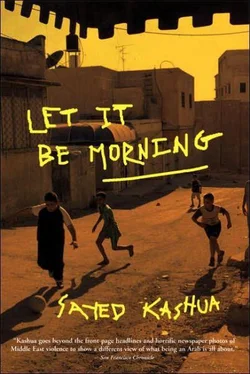I was so happy. I got to school before everyone and sat at the desk in front of the teacher. I put my bag down on the other chair, though that was unnecessary, since nobody really wanted to sit next to me. He’d arrive any minute now, and they’d see who I was sharing with. Bassel was one of the last to arrive, after the teacher had already come in. He was surrounded by his old cronies. I saw him in the doorway and gave him an enormous smile. I waved at him, and he laughed back. His whole gang laughed. He walked right past me, and I whispered, “Bassel, I reserved a place for you.” He looked down at me and didn’t say a word. Then he headed for his regular place at the back. I looked at him. He was just whispering something to the kids who were with him, and they looked at me and tried to stifle a laugh, to avoid being punished. He was moving his lips, and all I could make out was, “Asshole.”
I sit there in the car. Bassel comes full circle in his BMW and drives back toward me. I see him in the mirror. I’m not going to look in his direction. He slows down as he passes me and honks. Unthinkingly, I turn to look. Four men are gazing at me and laughing. Bassel waves.
Dinner is ready. There’s an enormous pot of cooked meat on the white plastic tablecloth outside, along with a big bowl of vegetable salad and a few other salads and spreads taken out of the fridge to be eaten before they spoil. We’re waiting for Father to get back from town hall. A car pulls up at the front of the house and he gets out. His face is grim as he walks toward us. He greets us and takes his place at the head of the table without another word. Mother takes his plate and heaps meat onto it. “You haven’t had anything to eat today, and the meat came out delicious.”
We start eating and wait to hear Father’s report on what transpired at the meeting. He doesn’t volunteer anything, and finally I have to ask him.
“They decided to hand over the Gazawiyya and the Daffawiyya, ” the people from Gaza and the West Bank, Father says.
“They did?” my older brother asks. “Is that what the government got the mayor to do?”
“No,” Father says. “The mayor has no idea what they want, but he figures, like everyone else, that the main concern of the police is the Palestinian workers. He’s right.”
“So what are they doing? Just how are they going to hand them over?” I ask.
“If the electricity stays disconnected till tomorrow morning and the roadblock stays in place, they’ll hand over the illegal workers to the security forces. But only the adults, the ones over fourteen.”
There are hundreds of workers from Gaza and the West Bank in the village. Many of them work for contractors from the village and others work inside the village itself, in construction, sanitation or gardening. They generally sleep on straw mats at the building sites, and a few lucky ones get to spend the night in large groups in warehouses belonging to their employers. In the past they could work inside Israel, but ever since the first Intifada they can no longer work there unless their employer has Israeli citizenship. In fact, workers coming from the cities and villages have become one of the most important sources of income for people in our village. Anyone who ever did a day’s work as a construction worker has turned into a contractor, farming out work to people from Gaza or the West Bank, thanks to his Israeli citizenship. Besides the dozens of new “contractors” sprouting up in every Arab town and village inside Israel, many also transport workers to Tel Aviv, Netanya and other Israeli cities. Many of the drivers become their would-be sponsors. The workers clean, cook, work the assembly line, and the Israeli driver, the only person legally entitled to collect their salaries, distributes it after taking his fat cut. To a large extent, it is the inhabitants of the West Bank and Gaza are responsible for the prosperity of the village.
In other words, they are also responsible for the commercial boom. Once, before it all began, the Jews preferred to do their shopping in the cities of the West Bank, where they figured things were cheaper, and in fact things really were cheaper there. But since the Intifada began, about fifteen years ago, the Jews began to feel threatened and moved over to the Arab towns and villages within Israel itself, which were a little safer. For all intents and purposes, our village replaced two cities, Qalqilya and Tul-Karm. So as the condition of people on the West Bank got worse and worse, things were looking up for Israeli Arabs. The houses being built were unlike any we’d seen before. Businesses flourished and luxury cars could be seen outside almost every home in the village.
Besides the workers you could find hundreds of former West Bank and Gaza inhabitants in the village, people who’d managed to get Israeli citizenship once the Palestinian Authority was set up in the territories. In the past they had collaborated or had worked with the security forces, and they were now given a place to live in Arab villages within Israel, for their own protection. The local residents objected at first to the idea of harboring these traitors, but they soon discovered the economic advantages of hosting the new inhabitants. The Israeli government rented homes for them and paid well, and their purchasing power was nothing to sneeze at. Those people weren’t being handed over; they were legal, after all, just like us.
The second Intifada was quite a problem. It undermined the whole economy and led to a deep recession, which affected everyone. Besides, the Jews were much less comfortable about driving into our village because of all the stories about the Islamic Movement and all the news programs that harped on how the Arabs were helping the terrorist organizations. Border Patrol squads had begun late-night raids. They’d swoop down on the warehouses and construction sites and detain workers who were defined as illegal. Now the mayor and the inhabitants of the village were volunteering to do this job for the state.
My father told us that all the heads of families had attended the meeting at the town hall. Some, the ones who were always opposed to the mayor, were opposed again, just as they’d object to building a new school simply because they were in the opposition and because of the long-standing animosity between families. But once the mayor explained that there was no choice, that if things went on this way for one more day there would be no drinking water left, they backed down. It turned out that the water pumps had stopped functioning when the power was cut, and that there was unlikely to be any water in the pipes by tomorrow morning. The mayor told everyone that this was why the sewage system wasn’t working, and that pretty soon all of the homes would become stopped up, and people would have to start taking a shit outdoors, the way they used to long ago. He said that although people still had enough to eat, there wasn’t enough money in the banks, so that some families wouldn’t even have enough for bread. And those who did were too late, because there was no food left in the stores.
“And what did you say, Father?” I wanted to know.
“I said that we should go to prayers and that by tomorrow it would all blow over, but if there was no choice, there was no choice. Because we’re not like them, we can’t last long. This isn’t Jenin, everything here is Israeli — the banks, the electricity, the water, the sewage, even the milk we drink comes from the Israeli dairies. We can’t last more than two days here. If it goes on for a week, people will starve to death. They’ll get dehydrated, they’ll get sick.”
“But who said the workers were the real reason for it all?”
“What else could they want? What other reason could there be? It’s only the workers, they’re the reason for it all.”
Читать дальше












